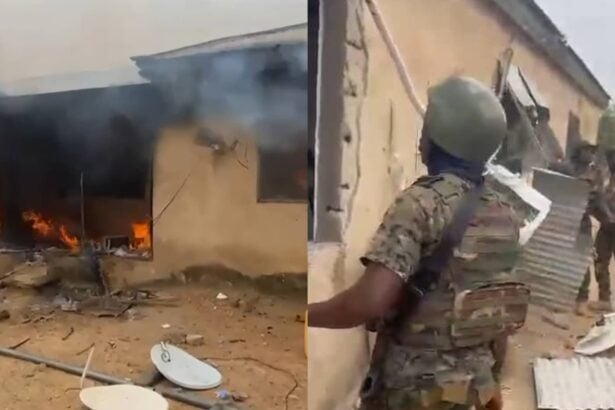The escalating tensions in Bawku, Ghana, reached a fever pitch on Thursday with an arson attack on the residence of Mahama Ayariga, the Member of Parliament for Bawku Central and Majority Leader in Parliament. This incident marks a significant escalation in the long-standing chieftaincy conflict that has plagued the town, igniting a surge of violence in recent weeks and raising serious concerns about the security situation. The attackers, who remain unidentified, stormed Ayariga’s home in the early hours of the morning, vandalizing property and setting portions of the building ablaze. While emergency services managed to contain the fire, preventing the complete destruction of the structure, the attack has further destabilized the already volatile region, intensifying anxieties and fears of reprisal attacks amongst residents.
The immediate response to the arson attack has been a significant increase in military presence throughout Bawku. Armed forces have been deployed to key locations within the town, focusing on protecting critical infrastructure and preventing further outbreaks of violence. This heightened security posture includes increased patrols in surrounding communities, an effort to maintain order and contain the unrest within Bawku. The deployment underscores the severity of the situation and the government’s commitment to quelling the violence, but it also reveals the deep-seated nature of the conflict and the difficulty in establishing lasting peace.
The attack on Ayariga’s home followed closely on the heels of a separate violent incident that further fueled the unrest. Just one day prior, clashes erupted in the town, resulting in one fatality and several injuries. The confrontation stemmed from an alleged forced eviction of market women from a particular trading area by a group of youths, believed to be from a rival ethnic group. Police intervention, intended to de-escalate the situation, unfortunately spiraled into a shootout, exacerbating tensions and contributing to the general atmosphere of fear and instability in Bawku.
The escalating violence culminated in retaliatory attacks on police infrastructure. In the ensuing chaos, angry mobs targeted multiple police facilities, including the residence of the Bawku Divisional Police Commander. These attacks not only highlight the breakdown in law and order but also demonstrate the deep-seated mistrust between segments of the community and law enforcement agencies. This erosion of trust poses a significant challenge to restoring peace and stability in the region.
While the government has yet to release an official statement regarding the specific attacks and the overall deteriorating security situation in Bawku, local leaders have stepped forward, appealing for calm and urging residents to cooperate with authorities in their efforts to restore peace. These calls for de-escalation underscore the urgent need for community-based solutions and dialogue to address the underlying issues fueling the conflict. However, given the history of violence and deep-seated divisions within the community, achieving sustainable peace will require a concerted and sustained effort from all stakeholders.
Despite the increased military presence and the pleas for calm from local leaders, a palpable sense of anxiety pervades Bawku. Residents remain fearful of potential retaliatory attacks, a concern that reinforces the cyclical nature of violence in the region. The underlying chieftaincy dispute, compounded by ethnic tensions and socio-economic grievances, continues to be a source of instability. The recent escalation underscores the urgent need for a comprehensive and multifaceted approach to resolving the conflict, encompassing not only security measures but also addressing the root causes of the unrest and fostering genuine reconciliation within the community. Until these deeper issues are addressed, the threat of further violence will continue to loom over Bawku.














